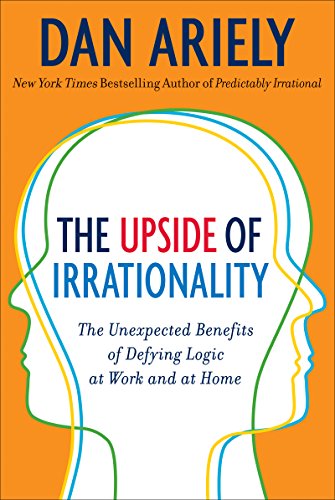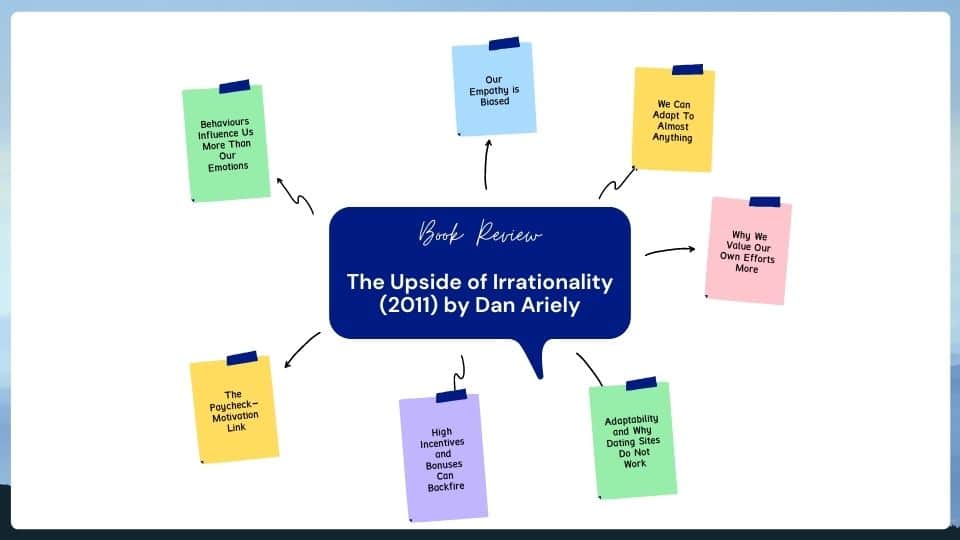We all would love to be rational all the time, make sensible decisions, and act reasonably. However, Dan Ariely shows in his latest book that humans are rarely rational, and the truth is that our irrationality affects our decision-making our actions all the time.
In The Upside of Irrationality (2011), Dan Ariely calls out our behaviors for being irrational, and the surprising positive and negative effects of the same.
He discusses how to become aware of our behaviours in these situations and what we can do :-
1. High Incentives and Bonuses Can Backfire
Most of us look forward to that time in the year when we are about to receive our yearly bonuses. Most put in extra effort at work, burn the midnight oil and push themselves to the limits, to show that they deserve every penny of it. High incentives and hefty bonuses were introduced with a view to increasing employee output. However, recent studies show the opposite.

High incentives and hefty bonuses put immense pressure on employees. It is a known fact that while a healthy amount of pressure can manifest better performance, it can also work negatively. Such pressure can become detrimental, especially when it comes to creative work, innovation, and problem-solving. The race ‘to be worth it’ results in hypermotivation – a state where one is so highly motivated to perform that they fail due to the extreme build-up of pressure and stress.
For Example – The impact of pressure and stress can be seen in executives who are motivated and well prepared to give a high-impact speech but do not perform well in front of an audience.
Bonuses and incentives that do not raise the stakes too high do not put pressure and extreme stress on individuals. An average incentive will still motivate performance, yielding better results.
2. The Paycheck-Motivation Link
The foregoing notion that a paycheck motivates people to perform is irrational. Animal psychologist Glen Jenson used the term contrafreeloading to describe a behavior exhibited by many animals such as monkeys, birds, and fish – that they prefer to earn their food as a reward for completing a task rather than to get it free.
This concept is also true for human beings and their motivation to work. Internal motivators like meaning and recognition are important conditions for high performance and motivation. External motivators like the paycheck are never enough to motivate people to do their best work.
Moreover, contrary to Adam Smith’s division of labor theory, it is found that people feel devalued and demotivated when assigned overly simple tasks. For Example, Workers involved in simple manual repetitive jobs such as screwing on bolts to metal in a car factory, do not feel involved in the end-product.
Since many employees today feel demotivated due to the lack of meaning in their work, organizations should acknowledge it and work harder in employee engagement programs and recognition of performance, rather than just using salary as a motivator.
“Wouldn’t economics make a lot more sense if it were based on how people actually behave, instead of how they should behave?” — Dan Ariely
3. Why We Value Our Own Efforts More
Humans have a natural tendency to over-value their own work and feel pride in their work and effort. However, human beings do not need to put a huge amount of effort into a task to appreciate themselves. There is an irrational tendency to be biased toward one’s own work.
We tend to be blind to the idea that we overvalue our work. If you have children, for example, you probably think of them as the best children on the planet. Well, most parents do!
Conversely, simply effort is not enough. Humans crave a sense of completion too, without which, their motivation for completion and positive bias towards their own work fades.
4. We Can Adapt To Almost Anything
Humans are shown to have high adaptability to their environment. We crave normalcy and our bodies as well as emotions have evolved to get back to normalcy soon after we experience any change in circumstances. Our adaptability is an excellent novelty filter and makes us sensitive to even the smallest of change in our surroundings.
We experience hedonic adaptation, the tendency of emotionally leveling out and adapting to expectations, or to new experiences, both positive as well as negative. Example: Hedonic adaptation can be understood better when we look at shopaholics. They tend to adapt to their new purchases so fast that they get bored soon. Then they need to experience the excitement of a new purchase again, only to adapt to it again.
The best way to use our natural adaptation to our advantage is to not interrupt our negative life experiences when they happen. This way, we can adapt to negative changes faster. Similarly, we should try to interrupt positive experiences to keep the excitement alive.

5. Adaptability and Why Dating Sites Do Not Work
Our ability to adapt to our surroundings is a major factor that affects our choices in dating. Moreover, as irrational as it sounds, it gives us insight into why dating sites do not work well.
To begin with, when it comes to dating, people tend to choose partners who are like them, especially when physical attributes are concerned. Therefore, while someone with average looks will desire an attractive partner, he will naturally (or irrationally) end up choosing someone who has average looks. The person will place more value in some non-physical quality due to our human nature to adapt to what we have and level out our expectations.
It is this adaptability that causes dating sites to fail. Irrationality impacts our decisions when it comes to love. Online dating sites that categorize people based on their attributes such as favorite movies, hair color, income, etc. using checklists and multiple-choice questions fail. In reality, dating works when two people get to know each other better and spend time together.
I no longer idolize reason. I have come to accept that ninety percent of what we do is irrational and that we spend what little rational thought we have in justifying our irrationality. — Rita Mae Brown
6. Our Empathy is Biased
Humans are empathetically biased, especially when it comes to choosing to act or react to tragedies. The problem lies in the fact that we look for closeness, detailed information, vividness, and relatability to the tragedy for it to make an impact on us. This irrational tendency is known as the identifiable victim effect.
For Example: News about a child fallen down a well shaft will affect us more than then the news of a mass murder. It was Stalin who said “One man’s death is a tragedy, but a million deaths is a statistic.”
At the same time being completely rational is not the answer either. Pure, unadulterated rationality discounts everything else that does not directly threaten, concern, or profit, and therefore will eliminate the aspect of empathy altogether. Some bit of irrationality is essential to make decisions we can live with and feel good about, in the future.
7. Behaviours Influence Us More Than Our Emotions
Humans tend to remember and take cues, from their past behaviors rather than from their past emotional states. We tend to believe that we had a reasonable reaction back then and that a new situation warrants the same reaction again. This tendency is called self-herding.
Example: Consider a situation where a person is on an important phone call and his children are making trouble. He scolds them and that makes the kids leave the room. The person will tend to remember that his negative reaction of yelling (and not his emotional state) at them caused the kids to keep quiet. That will get him to believe that scolding them is ok, making it a habit.
It is therefore essential to be wary of how we react to certain situations, especially in negative reactions. The failure to recall our emotions when we swore at our friend prevents us from doing the same thing next time.
In conclusion, human behavior is complex in nature. When we think that we are, or need to behave rationally and make objective decisions, we tend to give in to irrationality. In this book, the author Dan Ariely shows us both sides of the irrationality coin, and how biases influence our behavior and way of thinking.
